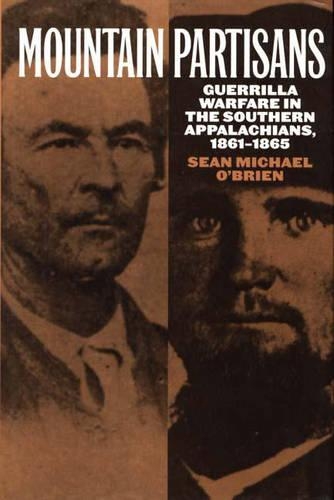
Mountain Partisans: Guerrilla Warfare in the Southern Appalachians, 1861-1865
(Hardback)
Publishing Details
Mountain Partisans: Guerrilla Warfare in the Southern Appalachians, 1861-1865
By (Author) Sean O'Brien
Bloomsbury Publishing PLC
Praeger Publishers Inc
30th September 1999
United States
Classifications
Tertiary Education
Non Fiction
Irregular or guerrilla forces and warfare
Military history
973.74
Physical Properties
Hardback
264
Width 156mm, Height 235mm
595g
Description
This is the story of a civil war within the Civil War. Many mountain whites in Southern Appalachia opposed the Confederacy, especially when the South's conscription and impressment policies began to cause severe hardships. Deserters from the Rebel army hid in the mountains and formed guerrilla bands that terrorized unprotected Confederate homesteads. Violence escalated as Rebel guerrillas fought back. The conflict soon took on some of the ugliest aspects of class warfare between poorer mountain whites, who were usually Unionists, and the more well-to-do mountain property owners, who supported the Rebels. Mountain Partisans penetrates the shadowy world of Union and Confederate guerrillas, describes their leaders and bloody activities, and explains their effect on the Civil War and the culture of Appalachia. Although it did not alter the outcome of the war, guerrilla conflict affected the way the war was fought. The Union army's experience with guerrilla warfare in the mountains influenced the North's adoption of hard war as a strategy used against the South in the last two years of the war and helped shape the army's attitude toward Southern civilians. Partisan warfare in Southern Appalachia left a legacy of self-imposed isolation and distrust of outsiders. Wartime hatreds contributed to a climate of feuds and extralegal vigilantism. The mountain economy never recovered from the war's devastating effects, laying the groundwork for the region's exploitation and impoverishment by outside corporations in the early 20th century.
Reviews
"Mountain Partisans throws a hard, sharp spotlight on the independent nature of mountain folk--how the landscape affected the folkscape, thereby creating a very different environment and hence, a very different war. A worthy addition to the growing body of information on this savage war within a war."-Tom Goodrich coauthor of Bloody Bill Anderson: The Short Savage Life of a Civil War Guerrilla
[T]his book will prove quite useful as a reference work for professional historians and for local historians and students who will be able to use it to launch their own research.-The Journal of Military History
A very good account of the irregular fighting in the Appalachian regions of Kentucky, Tennessee, the Carolinas, Georgia, and Alabama during the Civil War...-The NYMAS Newsletter
Mr. O'Brien has done a first rate job with this work...I would recommend Mountain Partisans as a springboard for further research in this neglected area of American history. It is a good book.-The Civil War Courier
O'Brien has offered a well-written analysis that attempts to fill a significant gap in Civil War scholarship.-Appalachian Journal
"This book will prove quite useful as a reference work for professional historians and for local historians and students who will be able to use it to launch their own research."-The Journal of Military History
"[T]his book will prove quite useful as a reference work for professional historians and for local historians and students who will be able to use it to launch their own research."-The Journal of Military History
"A very good account of the irregular fighting in the Appalachian regions of Kentucky, Tennessee, the Carolinas, Georgia, and Alabama during the Civil War..."-The NYMAS Newsletter
"O'Brien has offered a well-written analysis that attempts to fill a significant gap in Civil War scholarship."-Appalachian Journal
"Mr. O'Brien has done a first rate job with this work...I would recommend Mountain Partisans as a springboard for further research in this neglected area of American history. It is a good book."-The Civil War Courier
Author Bio
SEAN MICHAEL O'BRIEN is a freelance writer with experience in the U.S. military and in education. A former college instructor, he calls the Southern Appalachians home. He is the author of numerous articles on the Civil War and Southern military history.
